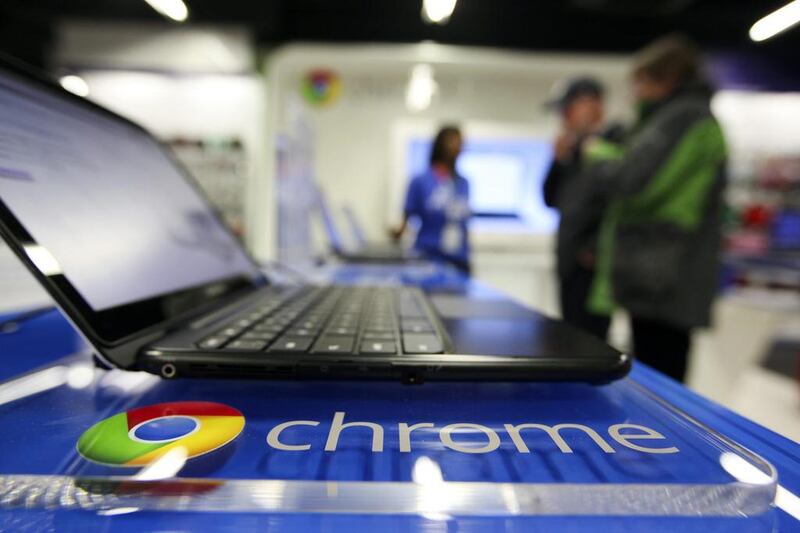Google has an enormous amount of data about its users. Joseph Dana and Faisal Al Yafai take opposing views on whether this is a good thing
Joseph Dana has given his personal data to Google ... and he’s very happy about it
For the first time, I don’t own a computer. Well, I don’t own a computer in the traditional sense. I recently purchased a Chromebook, designed and manufactured by Google. For those who are unfamiliar with the product, Chromebooks are laptops that exclusively run Google’s web browser.
They start up in seconds because they run no programmes other than Chrome. They never have viruses and they are always up to date. For word processing, I rely on Google’s office suite, while the rest of my needs – from Spotify to Netflix – are accessed via their web pages. Gone are the days of buying software, as the applications are now available free online. As most of our computing lives are spent on web pages, unless you require specialised software, the Chromebook is all you need.
There is a price to pay for this brave, new world of personal computing – and it is a big one. In exchange for the free use of Google’s products, I hand over the most personal details of my everyday life to an advertising company. Google has a highly developed profile of me, much more so than any government agency or, perhaps, even myself.
Google is an information company. The more information the company collects about me, the better it can tailor adverts for me. The Chromebook is the ultimate vehicle for Google’s advertising aims because my entire computing existence happens on Google’s servers.
Perhaps you think I am crazy for embracing this lopsided relationship with Google, but let me explain. Gone are the days of the free and open internet. It is not just Google that collects my personal information but Facebook (and its wholly owned subsidiaries WhatsApp and Instagram), Twitter, Snapchat, Microsoft and Apple too. Unless you remove yourself from the internet entirely, companies will continue to collect information about you – and there is little you can do about it (unfortunately, Chrome’s incognito browser doesn’t really help here). I am clearly on board with Google, yet I am still evaluating my relationship with other tech firms.
In an episode of the American version of the comedy series The Office, Dwight, the loveable tech-savvy office nerd, is seen writing in a paper notebook. One of his co-workers asks what he is doing, and he responds, “I am keeping secrets from my computer”. We shouldn’t be afraid of Google and others, but it might be a good idea to have a journal around just in case.
jdana@thenational.ae
On Twitter: @ibnezra
You should be careful what deails you give to tech companies, writes Faisal Al Yafai
In the modern world, information is to governments as gold was to ancient empires: it attracts them, they crave it and hoard it, casting a jealous eye on any entity that has more of it than they do – and inevitably seeking to take it by force. As empires used to wage war in the pursuit of gold, so governments today wage cyber and legal wars against anyone who has information that they don’t – even if those are companies in their own countries.
The United States already wages cyber war on countries around the world, just as countries wage it against them, probing their defences to see what they can extract. But the US also wages legal wars against its own companies, requesting data from Google, Facebook and Apple, and threatening legal retribution unless they hand it over. Away from the public gaze, they often do.
And yet, for all the concerns about the US government holding vast amounts of data on citizens and non-citizens, there is, at least one defence, feeble though it may be: transparency. The US government can at least, in theory, be forced to say what information it holds on its citizens. Google, so far, cannot.
Yes, internet companies will allow you to download what data they hold, but the most valuable data is not downloadable. It lies in the connections and the metadata – where you were and when, who you connect with, when, for how long, in which place.
When Joseph Dana says Google has a highly developed profile of him, he is vastly underestimating the potential reach of that information.
There are patterns in data that are easily spotted but are almost invisible to us. Who do you contact first thing on a Sunday morning? Who do you email last thing at night? What do you search for on Friday afternoons when your husband’s or wife’s Instagram says they are out shopping?
By cross-referencing different networks, a granular picture of your likes and dislikes, hopes and fears emerge. Not only do you have no control over what happens to that data, but you also don’t know of its existence and have no way of finding out.
Most of the products made by Google, Facebook and Twitter are free. If you don’t like it, they will happily say, stop using our products. We hand over our most precious thoughts, photos, words and ideas to companies that we have literally no power over. They offer their products to us for free, but at a price that is incalculable.
falyafai@thenational.ae
On Twitter: @FaisalAlYafai





